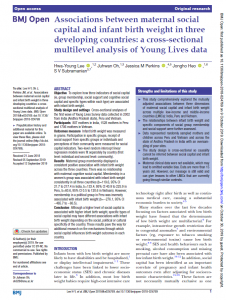
Objective
To explore how three indicators of social capital (ie, group membership, social support and cognitive social capital and specific types within each type) are associated with infant birth weight.
Study
Cross-sectional analyses of the first wave of Young Lives Survey data collected in 2002 from India (Andhra Pradesh state), Peru and Vietnam.
Participants
807 mothers in India, 1528 mothers in Peru and 1706 mothers in Vietnam.
Outcomes
Measure Infant birth weight was measured in grams. Participation in specific groups, receipt of social support from specific groups or individuals and perceptions of their community were measured for social capital indicators. Two-level random intercept linear regression models were fit separately by country (first level: individual and second level: community).
Results
Maternal group membership displayed a consistent positive association with infant birth weight across the three countries. There was no relationship with maternal cognitive social capital. Membership in a women’s group was associated with infant birth weight consistently in all three countries (b=119.6, 95% CI 21.7 to 217.4 in India, b=133.4, 95% CI 40.9 to 225.9 in Peru, b=60.6, 95% CI 0.5 to 120.6 in Vietnam). However, membership in a political group in Peru was inversely associated with infant birth weight (b=−276.1, 95% CI −465.7 to −86.5).
Conclusion
Although a higher level of social capital is associated with higher infant birth weight, specific types of social capital may have different associations with infant birth weight depending on the social, political or cultural specificity of the country. These results pave the way for additional research on the mechanisms through which social capital influences birth weight outcomes in each country.